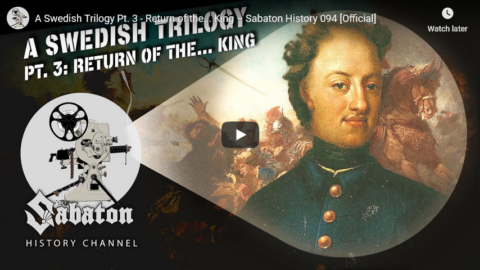World War Two
Published 19 Nov 2020How did the non-German Axis fare against the Soviet Union? What was the intelligence agency of the Free French like? And what were the Louisiana Maneuvers? All these questions are answered in this edition of Out of the Foxholes.
Join us on Patreon: https://www.patreon.com/TimeGhostHistory
Or join The TimeGhost Army directly at: https://timeghost.tvFollow WW2 day by day on Instagram @ww2_day_by_day – https://www.instagram.com/ww2_day_by_day
Between 2 Wars: https://www.youtube.com/playlist?list…
Source list: http://bit.ly/WW2sourcesHosted by: Indy Neidell
Written by: Ian Irungu, Shaun Harrison, Dennis Stepanov
Director: Astrid Deinhard
Producers: Astrid Deinhard and Spartacus Olsson
Executive Producers: Astrid Deinhard, Indy Neidell, Spartacus Olsson, Bodo Rittenauer
Creative Producer: Maria Kyhle
Post-Production Director: Wieke Kapteijns
Research by: Ian Irungu, Shaun Harrison, Dennis Stepanov
Edited by: Karolina Dołęga
Sound design: Marek Kamiński
Map animations: Eastory (https://www.youtube.com/c/eastory)Colorizations by:
– Norman Stewart – https://oldtimesincolor.blogspot.com/
– Mikołaj UchmanSources:
– Bundesarchiv
– Library of Congress
– Imperial War Museums: MI 14/822/12
– The Icons from Noun Project: Letter by Mochammad Kafi, Headphones by Simon Child, Russian soldier by Wonmo Kang, Skull by Muhamad UlumSoundtrack from Epidemic Sound:
– “Break Free” – Fabien Tell
– “Moving to Disturbia” – Experia
– “Other Sides of Glory” – Fabien Tell
– “Please Hear Me Out” – Philip AyersArchive by Screenocean/Reuters https://www.screenocean.com.
A TimeGhost chronological documentary produced by OnLion Entertainment GmbH.
November 20, 2020
A Swedish Trilogy Pt. 3 – Return of the … King – Sabaton History 094 [Official]
Sabaton History
Published 19 Nov 2020The defeat in the Battle of Poltava had shattered the Swedish Army of King Charles XII. Retreating south into the territory of the Ottoman Empire, the “Northern Paladin” becomes the honored guest of the Sultan. But Charles XII. is restless. Despite the comforts and luxury, he enjoys at the fortress of Bender, the King yearns for a chance to regain the initiative. More and more he gets involved in Ottoman politics, urging the High Porte to renew its enmities with the Russian Tsar. But even a famous King has to learn that hospitality has its limits.
Support Sabaton History on Patreon:
https://www.patreon.com/sabatonhistoryListen to “Shadows” on the album Metalizer: https://music.sabaton.net/Metalizer
Listen to Sabaton on Spotify: http://smarturl.it/SabatonSpotify
Official Sabaton Merchandise Shop: http://bit.ly/SabatonOfficialShopHosted by: Indy Neidell
Written by: Markus Linke and Indy Neidell
Directed by: Astrid Deinhard and Wieke Kapteijns
Produced by: Pär Sundström, Astrid Deinhard and Spartacus Olsson
Creative Producer: Maria Kyhle
Executive Producers: Pär Sundström, Joakim Brodén, Tomas Sunmo, Indy Neidell, Astrid Deinhard, and Spartacus Olsson
Community Manager: Maria Kyhle
Post-Production Director: Wieke Kapteijns
Editor: Karolina Dołęga
Sound Editor: Marek Kamiński
Maps by: Eastory – https://www.youtube.com/c/eastory
Archive: Reuters/Screenocean – https://www.screenocean.comSources:
The Poltava Battle History Museum
Library o of Congress
Livrustkammaren
Nationalmuseum
Musée de l’Ermitage
Battle of Prut 1711 courtesy of Charles Alexis Gérard
Cannon by Graphic Nehar from the Noun ProjectAll music by: Sabaton
An OnLion Entertainment GmbH and Raging Beaver Publishing AB co-Production.
© Raging Beaver Publishing AB, 2019 – all rights reserved.
The political danger if the “chumps” unite
In City Journal, James B. Meigs describes what he calls the “Chump Effect” in American politics:

Senator Elizabeth Warren speaking at the Iowa Democrats Hall of Fame Celebration in Cedar Rapids, Iowa, on 9 June, 2019.
Photo by Lorie Shaull via Wikimedia Commons.
Last January, a small but telling exchange took place at an Elizabeth Warren campaign event in Grimes, Iowa. At the time, Warren was attracting support from the Democratic Party’s left flank, with her bulging portfolio of progressive proposals. “Warren Has a Plan for That” read her campaign T-shirts. The biggest buzz surrounded her $1.25 trillion plan to pay off student-loan debt for most Americans.
A man approached Warren with a question. “My daughter is getting out of school. I’ve saved all my money [so that] she doesn’t have any student loans. Am I going to get my money back?”
“Of course not,” Warren replied.
“So you’re going to pay for people who didn’t save any money, and those of us who did the right thing get screwed?”
A video of the exchange went viral. It summed up the frustration many feel over the way progressive policies so often benefit select groups, while subtly undermining others. Saving money to send your children to college used to be considered a hallmark of middle-class responsibility. By subsidizing people who run up large debts, Warren’s policy would penalize those who took that responsibility seriously. “You’re laughing at me,” the man said, when Warren seemed to wave off his concerns. “That’s exactly what you’re doing. We did the right thing and we get screwed.”
That father was expressing an emotion growing more common these days: he felt like a chump. Feeling like a chump doesn’t just mean being upset that your taxes are rising or annoyed that you’re missing out on some windfall. It’s more visceral than that. People feel like chumps when they believe that they’ve played a game by the rules, only to discover that the game is rigged. Not only are they losing, they realize, but their good sportsmanship is being exploited. The players flouting the rules are the ones who get the trophy. Like that Iowa dad, the chumps of modern America feel that the life choices they’re most proud of — working hard, taking care of their families, being good citizens — aren’t just undervalued, but scorned.
The word “chump” probably derives from an ancient Norse term for a stump or large chunk of wood. The modern word “blockhead” comes to mind, which — no coincidence — was Lucy’s favorite label for the too-trusting Charlie Brown in the Peanuts comic strip. Lucy never tired of snatching away the football; Charlie fell for it every time. We all know the feeling: when you’re inching forward in the freeway exit lane, say, and another driver flies past and swerves onto the ramp at the last second; when your child has to complete her college-entrance exams within a designated time period, but your neighbor’s child gets twice as long because of a suddenly diagnosed “learning disability”; when you pay extra to have your pet travel in the airplane’s cargo hold but the yipping poodle across the aisle, an “emotional-support animal,” gets to ride on its owner’s lap for free. You didn’t know that you could get an emotional-support card just by claiming an anxiety disorder and paying a fee to an online agency? What are you — a chump?
Quebec makes Canada’s politics really weird
J.J. McCullough
Published 2 Mar 2019Hypocrisies and blind spots stemming from the role played by French Canadians and the French language in Canada’s politics.
FOLLOW ME:
Support me on Patreon! https://www.patreon.com/jjmccullough
Join my Discord! https://discord.gg/xQzjBRE
Watch me on Twitch! https://www.twitch.tv/jj_mccullough
Follow me on Instagram! https://www.instagram.com/jjmccullough/
Visit my Canada Website http://thecanadaguide.com
QotD: Tolerance
Look, I don’t like the parading of emotions by politicians anyway: it’s not to my taste. But for a Liberal to speak ill of tolerance is to square-dance in a minefield. “Tolerance” is shorthand for the existence of a society in which persons cohabit, trade and debate without killing one another over their differences — even those differences which are serious, fundamental and intractable. Tolerance truly is the signature accomplishment of our country, and of countries like ours: it is the crucial difference between nice places to live and the not-so-nice. To dismiss it is to abandon the old liberals’ confidence that familiarity between different groups and sects may in fact lead to love and acceptance — that it is the foundation for the organic growth of a neighbourliness that cannot be ordered up like a meal or created by fiat.
Tolerance represents a mutual compact to which the state itself is a party. And its minimalism is an important feature. Tolerance does not ask you to approve of gay people, or to like atheists, or to appreciate a jaunty Sikh turban, or to trust a redhead. It insists only that you treat them as humans and fellow citizens — equal to yourself in legal endowments and social entitlements, and most particularly in the right to be left alone.
Tolerance means you do not persecute; you do not abuse; you do not commit or threaten violence. It is a restriction on behaviour, above all, or, more broadly, on conduct: it is not a test of one’s disposition, private opinions or feelings.
Colby Cosh, “‘Can we stop talking about tolerance?’ Lord, I hope not”, National Post, 2018-08-23.






